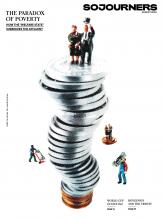IN MAY, UGANDA'S President Museveni signed a law that criminalizes same-sex sexual acts between consenting adults and allows for the death penalty in some cases. Homosexuality was already illegal in Uganda under a colonial-era law and punishable by life imprisonment. Uganda joins four other countries on the continent where being gay may be punishable by death.
When African leaders say that homosexuality is alien to African culture and is being introduced into Africa by Westerners, they are referring to African history that was strategically redacted over time by European colonizers and missionaries. This erasure was counter to original colonial annals that reflect exceptions to heterosexuality as far back as the 1500s. Portuguese documents identify esteemed same-sex male relationships in the kingdom of Kongo and a male-identified female warrior class in Dahomey.
One result of this redacted history is that in later anti-colonial struggles, African nationalists would uphold a moral “African” sexuality (one actually rooted in standards imposed by colonizers) against the immoral West, according to historian Marc Epprecht. Both religious and state power have been used to suppress LGBTQ+ people in African societies while also promoting heteronormativity for building the nation-state collective identity. Even today, “patriotic heterosexuality” is promoted by some state and religious leaders.
This religio-political system blurs the lines between state and religion. In fact, state power immediately positions itself as a tool for promoting collective Africanness within a particular nation-state, allowing it to make religion a partner in its use of force to control those it deems to exist at the peripheries of heteronormative society.
An example is in Uganda. The Anglican archbishop there has openly aligned the Anglican Church with the state authorities in ensuring that homosexuality is criminalized.
Luckily, the picture is not completely bleak.
Read the Full Article

